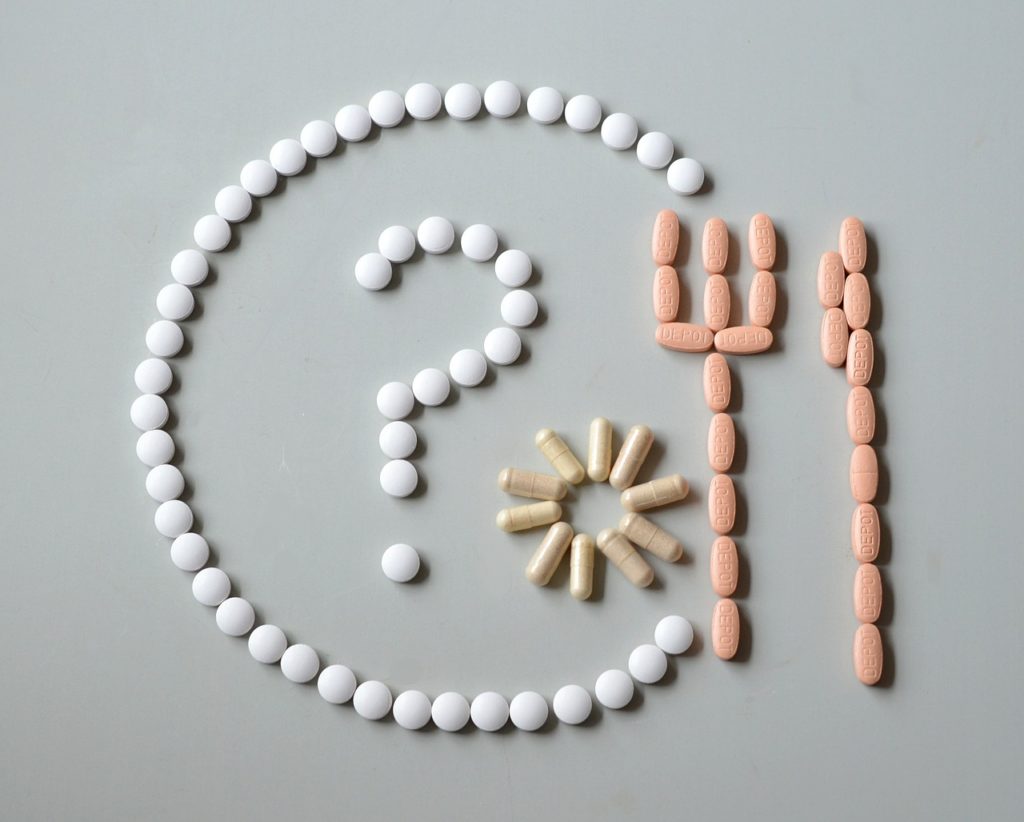
Thinking about getting a smarter brain? Unfortunately, nootropics can’t really do that. (You’ll have to read books and accumulate experiences and all that time-consuming crap to become genuinely smarter.) However, nootropics for beginners may help make the path to a smarter brain easier and, yes, healthier for nootropic newcomers — which is why more and more people are turning to natural nootropics for their brain boosts over the usual, cheap-O brain boosters on the market.
Coffee is great. But (and I truly believe this) nootropics are better (and, again, healthier). But where does one begin with nootropics? Do they actually work — and which ones work best? How do they work?? I’ll answer all of that and more below.
Page Contents
Nootropics for Beginners: The Basics
What Are Nootropics?
Simply put, nootropics are cognitive enhancers taken as nutritional brain health supplements. Already, I may have pissed off some of my more extreme-O “smart drug” nootropic enthusiasts (“Adderall is not nutritional??”); however, I base my definition of “nootropic” on the work of chemist Dr. Corneliu E. Giurgea, the founder of racetams and the first person to develop a criteria for nootropics. Dr. Giurgea’s criteria for nootropics include:
- Enhancement of learning acquisition
- Resistance to disruptive mental conditions
- Facilitation of neuronal transfer of information
- Enhanced resistance to physical & chemical brain injury
- Increased tonic cortico-subcortical control mechanisms
- Absence of usual pharmacological side effects of neuropsychotropic drugs
Because of this final criterion, smart drugs such as Adderall disqualify from the true “nootropic” definition. Instead, nootropics enhance the brain’s natural cognitive pathways towards better memory, focus, and energy — rather than ramping up these cognitive measures through synthetic means, possibly to the long-term detriment of brain health and function.
Don’t take me for some anti-progress Luddite: I am always excited for new nootropic compounds and extracts, even if they’re extracted through synthetic means. But for any new nootropic ingredient to truly qualify as “nootropic” in my book, it needs to: A) have human, clinical research to back up its brain benefit claims, and B) be safe to use with low-to-no risk of side effects.
Many supplement manufacturers try to label non-nootropic ingredients as “nootropic” to sell their products, but only so many ingredients actually work as genuine nootropics. And even of the ingredients that qualify for the nootropic label, only a modest percentage actually actually work.
Do Nootropics Work?
Some nootropics work. Other nootropics really work, whereas some substances referred to as “nootropic” don’t do anything at all — or at least anything towards cognitive enhancement. As a supplement genre, nootropics generally work by enhancing and/or protecting brain health and function in myriad ways.
Some of the most common bio-mechanisms of nootropics include:
- Brain energy production – not energy stimulation (à la caffeine) but energy production, boosting the brain’s natural ATP synthesis process.
- Neurotransmitter balance – acetylcholine, dopamine, serotonin — nootropics may assist with the key chemical players involved in healthy brain balance.
- Cerebral circulation – impaired circulation prevents adequate levels of oxygen and nutrients from reaching the brain; nootropic circulation enhancers may help.
- Brainwave promotion – namely alpha brainwaves, the brain frequency associated with calm, yet focused thinking; a meditative mix of relaxation and wakeful clarity.
- Neuroprotection – certain antioxidant nootropics do a fantastic job at reducing brain-aging free radicals, preserving brain integrity and longevity.
- Neuroregeneration – by boosting BDNF (brain-derived neurotrophic factor) and NGF (nerve growth factor), nootropic neurogenerators may help repair and maintain brain health.
Because the bio-effects of natural nootropics involve the brain’s natural cognitive pathways, many nootropics assist with bodily health as well. However, simply put, the most common benefits of nootropic supplementation include:
The Benefits of Nootropics
- Memory – long-term, short-term, and working memory; learning capacity.
- Focus – attention span, processing speed, mental acuity and performance.
- Energy – ATP energy production, metabolic balance, brain maintenance.
- Mood/Motivation – dopaminergic pleasure response, work productivity.
- Cognitive Longevity – antioxidant damage reduction, neurotoxin removal.
By enhancing various aspects of brain health and function, nootropics may improve various modes of thinking — from high energy mental performance to calm, relaxed creative expression. Of course, no single noot accomplishes all of these benefits, which is why most nootropic enthusiasts stack their noots. (See “What is a Nootropic Stack?” below.)
Are Nootropics Safe?

This is somewhat of a trick question. By definition, nootropics are safe — or at least “absent of usual pharmacological side effects of neuropsychotropic drugs.” (As according to Dr. Corneliu E. Giurgea.) If we’re strictly adhering to the original definition of nootropics, not only are they safe but they protect against cognitive impairment.
Even so, nootropic use (or misuse) may pose certain risks not otherwise associated with nootropics.
Used correctly, nootropics are safe. Yet, even water may pose certain health risks when taken incorrectly. While nootropic side effects are generally rare, there are risk factor considerations to take into… well, consideration. Examples of potential nootropic side effect risk factors include:
- Age – with evidence suggesting that the brain takes 25 years to fully develop, certain users may approach certain nootropics with caution up until the quarter century mark. (Having said that, there’s no conclusive evidence that nootropics significantly affect brain development in any detrimental manner.)
- Dosage – one of the most common side effect risks: taking too high of a dosage at once. E.g., citicoline is great, but 100 grams citicoline all at once is not.
- Frequency of Use – relating to dosage, taking nootropics too often may pose a risk over time, especially for high-powered noots that come with tolerance build up concerns.
- Ingredient Interactions – individually, nootropics are generally safe. Yet, stacking the wrong ingredient combos — or too many nootropics — per serving may come with negative ingredient interactions.
- Personal Tolerance – some users simply handle certain nootropics better than others, particularly when it comes to stimulant nootropics.
Again, the general answer to the question of nootropic safety is yes, nootropics are safe. And, generally speaking, higher quality nootropics come with reduced side effect risk. Of course, I’m largely discounting “smart drugs” (e.g., Adderall) from my definition of nootropic. More on Nootropic Safety.
Are Nootropics Legal?
Similar to the nootropic safety question, the question of nootropic legality is more or less the same: Yes, nootropics are legal for the most part. However, there are several branches to this answer, depending on the nootropic in question and where you’re buying/consuming the nootropic. If you want a country-by-country assessment of nootropic legality, I recommend checking out my article “Are Nootropics Legal?” which divides nootropics into two legal categories:
- Dietary Supplement – encompasses most natural nootropic substances, such as vitamins, minerals, and herbal extracts.
- Drug – these are your synthetics and semi-synthetics, lab-synthesized cognitive enhancers that might be regulated — i.e., sold by prescription.
Certain semi-synthetic nootropics straddle the line between dietary supplement and drug, giving them a sort of confusing legal status across the globe. For example, many nootropic supplements supply Huperzine-A, a natural compound synthetically extracted from Huperzia serrata, yet the compound is sold via prescription in China. Vinpocetine is another grey-area semi-synthetic.
And then there’s the question of nootropics in sport. Again, for the most part, natural nootropics are legal to use for competing athletes, whereas high-powered synthetics such as phenylpiracetam and modafinil (or adrafinil) are banned by the World Anti-Doping Agency (WADA). If you’re unsure on a nootropic’s legal status, check with your region’s food and drug regulatory branch.

Types of Nootropics
Not all nootropics are equal. But there must be enough commonality between certain nootropics to at least order them into like categories, right? That’s exactly right, my clever reader. Most nootropics can be split into the following types:
Vitamins and Minerals
Perhaps the most basic nootropic forms — vitamins and minerals. More often than not, it seems vitamin and mineral supplementation works under vitamin- and mineral-deficient conditions rather than under health nutrient conditions. As such, “nootropic” vitamins and minerals may better qualify as simply sound nutrition.
Even so, supplementing certain vitamins and minerals isn’t a bad idea for optimizing brain health and function. And certain synthetic nootropics may use vitamins in a way that genuinely enhances cognition — such as Sulbutamine, which is simply two thiamine molecules bonded together. Some vitamins — most notably B vitamins — enhance the effects of other nootropics. For example:
- Vitamin B6 – best taken in its P-5-P form, vitamin B6 works as a co-factor in the conversion process between L-tyrosine and other catecholamine neurotransmitters — e.g., dopamine and norepinephrine.
As you age, vitamin and mineral levels naturally deplete. Supplementing nootropic vitamins and minerals may help restore brain balance while boosting the effects of other nootropics.
Herbs and Herbal Extracts
Throughout ancient times, up to today, herbs and herbal mixtures have been used for just about anything — from bodily medicine to cognitive enhancement. Which is why herbal extracts are so popular in natural nootropic supplements. Many herbs boost the brain, and we’ve known this for centuries — modern science is still only catching up to anecdotal human research on a lot of this.
However, as modern science catches up with what we’ve already known about nootropic herbs, new technology and extraction methods have allowed supplement manufacturers to create more potent, effective forms of all of our favorite brain boosting botanicals. For example, we traditionally enjoy green tea leaves brewed as tea; yet, by extracting green tea antioxidants and polyphenols, supplement makers can isolate the neuroprotective benefits of green tea in more concentrated bursts.
The same may be said of Bacopa monnieri and its bio-active constituents (bacosides), and of Rhodiola rosea (rosavins and salidrosides). Funny enough, Rhodiola is an herb that overlaps with the next nootropic category.
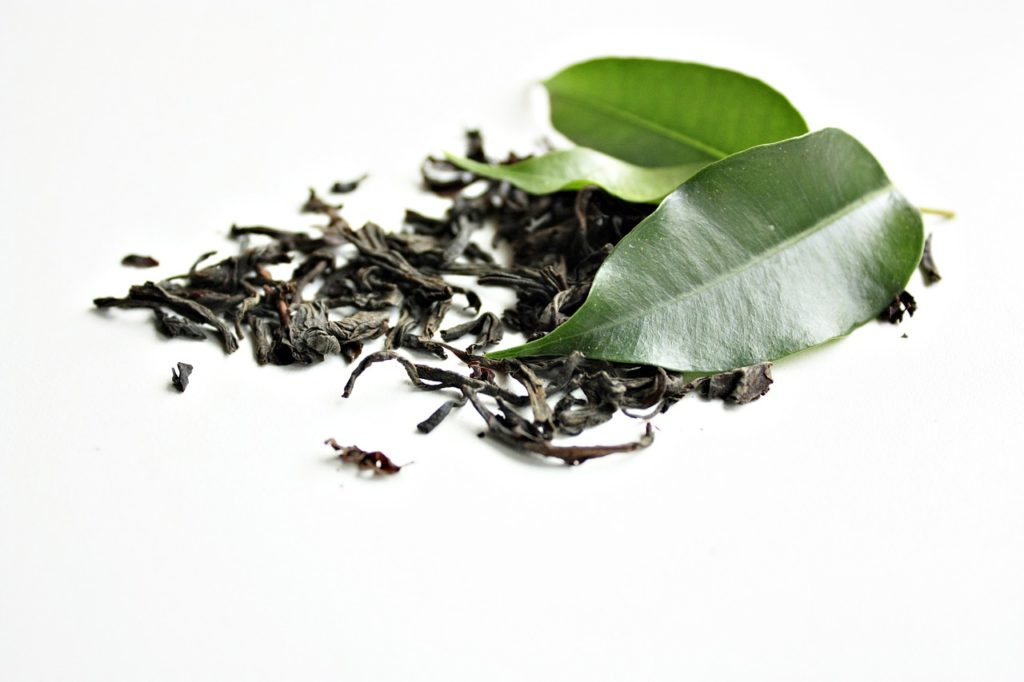
Adaptogens
Viewed as the anti-stress category of nootropics, adaptogens don’t quite work against stress so much as they help the body adapt to stress (hence the name: adaptogens).
Adaptogens are any substance that help regulate and balance the endocrine stress response. As an ergogenic health concept developed by the Soviet Union, adaptogens were originally intended to assist Russian athletes, astronauts, and other active USSR members with physical and mental performance. And because stress affects so many aspects of brain and bodily health, truly effective adaptogens — such as the aforementioned Rhodiola — come with a long list of benefits. “Cognitive enhancement” only takes up one portion of the adaptogen Venn diagram of health effects.
Everyone experiences stress, often on a daily level. Thus, adaptogens might be the best “starting-place” nootropics for beginners.
Phospholipids
Phospholipids are fats (lipids) and, well, phosphorus (phospho–) that make up the fatty acid chains required for a semi-firm, semi-permeable brain cell membrane. When I think of phospholipids, I can’t help but think damn, nature is cool. There’s really nothing quite like the phospholipid bilayer, which acts like a barrier against extracellular toxins while also keeping the cell membrane fluid and permeable enough to transmit the right materials in and out of a cell.

A healthy phospholipid bilayers equals healthy cell-to-cell communication.
Phosphatidylserine (PS) is perhaps the best example of a nootropic phospholipid supplement that may benefit cell-to-cell communication, especially when taken on a daily basis. Due to the brain’s natural decline in PS over time, PS is particularly great for cognitive longevity — namely memory longevity — although, the phospholipid also possesses significant sports performance benefits as well. Which means that you don’t have to wait until you’re an old fart to take this stuff.
Cholinergics
The brain needs choline to synthesize neurotransmitter acetylcholine, the brain chemical associated with memory and learning, and phosphatidylcholine, another key phospholipid. Similar to fatty phospholipids, choline is great for long-term brain health. The term cholinergics applies to nootropics that boost the brain’s choline status by:
- Supplying raw choline for acetylcholine synthesis.
- Inhibiting acetylcholine breakdown (acetylcholinesterase inhibition).
- Sharpening acetylcholine receptor sensitivity.
Two of the best cholinergics are citicoline and alpha-GPC, the latter possessing the highest concentration of nootropic choline. However, if the choice were mine, I’d choose citicoline, a two-part mix of choline and cytidine, the precursor to brain booster uridine.
Choline-related nootropics may boost several cognitive functions, including memory, focus, reparation, and energy. More on Choline.
Amino Acids
Amino acids are the building blocks of protein, which is to say that building blocks are the building blocks of life. (Okay, technically, the DNA sequences that code for amino acid sequences are the building blocks of life, but you get what I mean.) Bodybuilders value aminos for the muscle building potential.
Nootropic nerds value aminos for their brain boosting potential. (Ripped nootropic nerds may value aminos for their brain and body effects — not everything has to be either/or, y’all.)
Not many but some amino acids qualify as nootropics. And they work in significantly different ways — for example: L-Tyrosine converts to catecholamine brain chemicals for fast-acting focus and mood enhancement; L-Theanine promotes alpha brainwave frequencies for calm, creative thinking. And then there’s L-Taurine, which I guess helps you grow bull testicles — or something? Yeah, amino acids are unique.
Nootropics vs. Smart Drugs
Here’s a bit of a bonus category: smart drugs. As I already previously mentioned, I don’t qualify the likes of Adderall, modafinil, etc. in the nootropic category, namely due to their inherent side effect risk. Yet, certain synthetic “smart drugs” such as racetams and Noopept and picamilon — even caffeine — do possess legitimate nootropic benefits for particular purposes. Even so, more natural seeking nootropic users may outright avoid these “smart drug” ingredients solely on the all natural principle. But I do occasionally enjoy these bad boys, while simultaneously bearing in mind the distinction between natural nootropics and synthetic smart drugs. More on Nootropics vs. Smart Drugs.
What is a Nootropic Stack?
When you eat a burger, you don’t simply eat burger. You stack tomatoes atop lettuce atop bacon atop avocado atop burger atop cheese atop more avocado atop more bacon atop another burger, and you sandwich all those items between two buns. Likewise, when you take nootropics, you take nootropics — emphasis on the plural “s”.
In the unofficial, yet official technical nootropic jargon, the combination of two or more nootropics is called a stack. Ideally, a nootropic stack doesn’t include an arbitrary assortment of nootropics but rather a cohesive mix of cognitive enhancers that improve each other’s effects by:
- Synergy – when two or more nootropics increase their individual results by taking them all at once — as opposed to taking them individually at separate times.
- Complementation – when the effects of a nootropic counteract the negative effects of a separate nootropic (but not the positive effects).
- Multiplication – when two or more nootropics target the same bio-benefit through different angles.
Different stacks serve different purposes. For example, an energy stack may specifically include antioxidants and ATP boosters — i.e., nootropics specifically geared towards energy enhancement — whereas a memory stack may include cholinergics and phosphatidylserine. And if you want to crank it up to another layer, the cumulative total of your energy stack and memory stack and focus stack, etc. comprises your total nootropic stack. Thus, advanced nootropic enthusiasts may view their “stack” as a morning, afternoon, evening segmented regimen routine that differs from day-to-day based on the user’s particular goals and interests.
Nootropic stacking is a skill, which is why many nootropic users have turned to /r/Nootropics on Reddit to fine-tune their perfect stack.
How to Find a Good Nootropic Stack

Unless you’re buying a standalone nootropic ingredient, nootropic supplements are nootropic stacks. However, if you’re anything like me, you’re highly skeptical of supplements. In fact, before I dove into nootropics, I completely avoided supplements altogether. Yet, if my experience has taught me anything, I’ve learned how to identify potentially awesome (and potentially awful) nootropic supplements off-the-bat by ensuring that they fulfill the following checklist:
Are the ingredients well-researched? Many manufacturers make big health claims, yet don’t have the clinical chops to back them up. Some supplements even go so far as to suggest that their formulas are “clinically proven”, despite having zero clinical research under their belt. Avoid these guys, go with the nootropics with legitimate clinical research. (Quick trick: Google the nootropic in mind with “ncbi” and you’ll find a list of studies associated with the nootropic.)
Are the ingredients high quality? Check for patented ingredients and standardized herbal extracts on the Supplement Facts. If the herbs are plain powder, as opposed to potent standardized extracts, then odds are you’re dealing with an ineffective, low quality stack.
Is there a proprietary blend? It’s a classic supplement trick: claim the formula is a “proprietary secret” to hide the individual ingredient dosages beneath a proprietary blend, truly hiding the formula’s poor dosages overall. If a manufacturer is genuinely proud of their formula, they’d display it with full transparency.
Are the “Other Ingredients” reasonable? FD&C colorants? Unnecessary rice fillers? If the number of additives that go into the capsules and tablets compete with the number of ingredients in the actual formula, I say look for another, cleaner supplement.
Is there a product guarantee? Most customers don’t follow up on the guarantee. However, nootropic supplement manufacturers that supply a money-back guarantee (and a good one at that) seem to believe in their formula more than those who do not.
Best Nootropics for Beginners
Okay, enough of all the explanations and definitions and crap. What you probably came here for was the answer to one thing: Which nootropics are best?
Unfortunately, due to the variety of nootropics — as well as the variety of cognitive needs — the list of “best nootropics” is up to debate. (And depending on where you ask this question, it’s up to an extremely heated debate.) While I don’t have an absolute best single nootropic ingredient in mind, I have a few nootropics for beginners that are worth checking into:
- Citicoline – one part choline, one part cytidine; perhaps the best cholinergic.
- N-Acetyl L-Tyrosine – anti-stress precursor amino to catecholamine chemicals.
- Bacopa Monnieri – Ayurvedic memory and learning boosting herb.
- Rhodiola Rosea – powerful, fast-acting adaptogen for mental/physical performance.
- Phosphatidylserine – awesome phospholipid compound for memory and longevity.
- Ginkgo Biloba – ancient circulatory enhancing herb that boosts working memory.
- L-Theanine (+ Caffeine) – one of my daily favorites (L-theanine) that uniquely complements caffeine by reducing the drug’s jittery side effects while maintaining its focus and energy enhancing benefits.
And last but not least: racetams — but only with citicoline. This is another controversial item: whether or not a choline source is a necessary addition to racetam supplementation. Personally, racetams give me a headache if I don’t stack them with a choline source. Given the popularity of racetams and racetam-like substances, I’m not completely against them for their synthetic status. But it’s not a bad idea to stack them with a choline source (preferably citicoline) if you start your nootropic journey with the OG nootropics: racetams.
Best Nootropic Supplements for Beginners
Beginners may take several approaches to their first nootropic supplement, depending on their goals and interests. If you have the time, energy, and money, you may trial-and-error several, simple nootropic stacks, identifying which nootropic ingredients work for you and which ones do not. Or you may simply choose a premium, catch-all stack that covers all bases on cognitive health. Odds are if the latter option works for you, you won’t need much else to add to your daily nootropic regimen. Either way, here are a few of my best nootropic supplements for beginners recommendations:
Mind Lab Pro
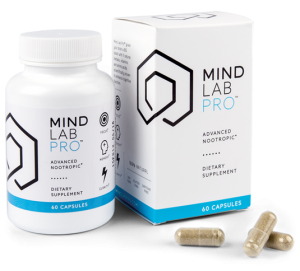 Mind Lab Pro easily falls in the “premium, catch-all stack” category with its Universal Nootropic formula designed to optimize 100% Brainpower for everyone — hence the “universal” aspect of this supplement. In total, Mind Lab Pro supplies 11 ingredients, each delivered in their most premium, potent forms.
Mind Lab Pro easily falls in the “premium, catch-all stack” category with its Universal Nootropic formula designed to optimize 100% Brainpower for everyone — hence the “universal” aspect of this supplement. In total, Mind Lab Pro supplies 11 ingredients, each delivered in their most premium, potent forms.
For the nootropic beginner, Mind Lab Pro is a great default option, establishing the base of your daily nootropic regimen, on which you may build a more specialized array of nootropic ingredients and supplements. Granted, Mind Lab Pro has just about everything you need for enhanced brain health and cognition. Having said that, the caffeine-free, synthetic-free design does allow MLP users to stack this formula with other stimulating options — and what’s more: MLP’s L-Theanine (as Suntheanine®) may help take the edge off those stimulants. Best taken with your morning coffee.
Read my in-depth review on Mind Lab Pro.
Performance Lab Mind
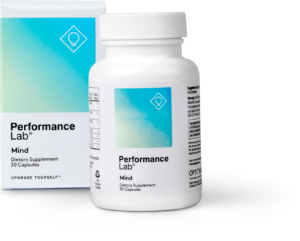 Performance Lab Mind has fewer ingredients than Mind Lab Pro, yet I view it as a slightly more advanced stack than Mind Lab Pro simply for the reason that this is a supplement that works best when stacked with other brain health stacks. Whereas Mind Lab Pro covers all bases on brainpower optimizing, Performance Lab Mind only covers the most important pathways with its simple, 4-ingredient formula. Those four ingredients being: Citicoline (as Cognizin®), Phosphatidylserine (as Sharp-PS®), N-Acetyl L-Tyrosine, and Maritime Pine Bark Extract.
Performance Lab Mind has fewer ingredients than Mind Lab Pro, yet I view it as a slightly more advanced stack than Mind Lab Pro simply for the reason that this is a supplement that works best when stacked with other brain health stacks. Whereas Mind Lab Pro covers all bases on brainpower optimizing, Performance Lab Mind only covers the most important pathways with its simple, 4-ingredient formula. Those four ingredients being: Citicoline (as Cognizin®), Phosphatidylserine (as Sharp-PS®), N-Acetyl L-Tyrosine, and Maritime Pine Bark Extract.
You don’t have to supplement Performance Lab Mind with other brain health stacks. In fact, if this is all you take, you’ll still have a significant cognitive edge over non-nootropic users. Yet, by supplying essentially the foundation of Mind Lab Pro, Performance Lab Mind allows beginners to achieve the primary benefits of Mind Lab Pro while still maintaining the prospects of specializing their daily nootropic allotment with a customized side-stack of personalized nootropic ingredients.
Read my in-depth review on Performance Lab Mind.
Brain Lift (f.k.a Study Juice)
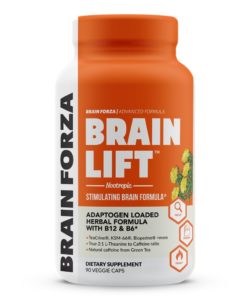 You’re midway through your first semester of college, shit’s starting to hit the fan, and so you’ve turned to supplements that may help maintain your cognitive health and sanity. For the collegiate nootropic beginner, Brain Lift (formerly known as Study Juice) is a great, dopaminergic, caffeine-powered option, given its reliable bursts of caffeinated energy, L-tyrosine mood enhancement, and adaptogenic stress relief.
You’re midway through your first semester of college, shit’s starting to hit the fan, and so you’ve turned to supplements that may help maintain your cognitive health and sanity. For the collegiate nootropic beginner, Brain Lift (formerly known as Study Juice) is a great, dopaminergic, caffeine-powered option, given its reliable bursts of caffeinated energy, L-tyrosine mood enhancement, and adaptogenic stress relief.
Typically, caffeine spoils a nootropic supplement. However, Brain Lift counterbalances its caffeine with brain relaxing, focus enhancing herbal extracts, delivering a unique push-pull effect on cognition.
And what’s more: Brain Lift seems to understand the student’s low budget, pricing itself appropriately. This stack is somewhat a steal of a deal.
Read my in-depth review on Brain Lift.
Qualia Mind
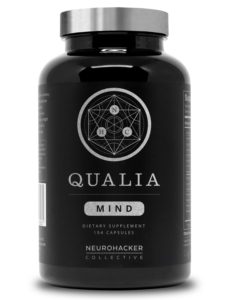 This is the nootropic beginner’s eff it, I’m all in option: Qualia Mind. By stacking nearly 30 ingredients in its formula, Qualia Mind is surprisingly the simplified version of Qualia Original Stack — a two-formula nootropic supplement with way too many ingredients crammed into its caps. I realize that the size of Qualia Mind (as well as its price) might be too much for the nootropic newcomer; however, I also realize that some of you out there might enjoy diving into the unknown full bore.
This is the nootropic beginner’s eff it, I’m all in option: Qualia Mind. By stacking nearly 30 ingredients in its formula, Qualia Mind is surprisingly the simplified version of Qualia Original Stack — a two-formula nootropic supplement with way too many ingredients crammed into its caps. I realize that the size of Qualia Mind (as well as its price) might be too much for the nootropic newcomer; however, I also realize that some of you out there might enjoy diving into the unknown full bore.
Qualia Mind is a full bore dive into natural nootropics, for better or worse. By point of comparison, consider Mind Lab Pro, which hits all of the important brain bio-pathways with only 11 ingredients, whereas Qualia Mind hits all the brain points and then some — possibly to the detriment of each ingredient’s efficacy.
If you have the money to spare, and you want to try everything all at once, Qualia Mind is your big superstack option.
Read my in-depth review on Qualia Mind.
Conclusion
The long and short of this long-winded post: nootropics benefit brain health and cognition, and, yes, you should take them. Because why not? Perhaps you’re afraid of side effects. True nootropics don’t have them (or at least come with a very minimal risk of side effects). Perhaps you’re afraid they have no effects. This may be true of certain substances labelled as “nootropic”; however, the best nootropics for beginners (and veterans) not only work but work for the long run, enhancing cognitive longevity as well as immediate brainpower.
Really, this is about the best I can do for you here. It’s up to you beyond this point to check out which nootropics may work particularly well for you — and if you need further help in deciding your stacks, you may read my other articles on which nootropics work for what. For example, here’s my latest post on nootropics for memory — in which I rundown the detriments of memory loss and how nootropics may help curtail age-related amnesia.
With that, I wish all you nootropic beginners good luck — and oh yeah: welcome to club!
For more on awesome brain-boosting nootropic supplements, check out my Best Nootropic Supplements to Buy in 2018 list. And be sure to comment any thoughts, questions, personal anecdotes, haikus, snafus, etc. down below!

